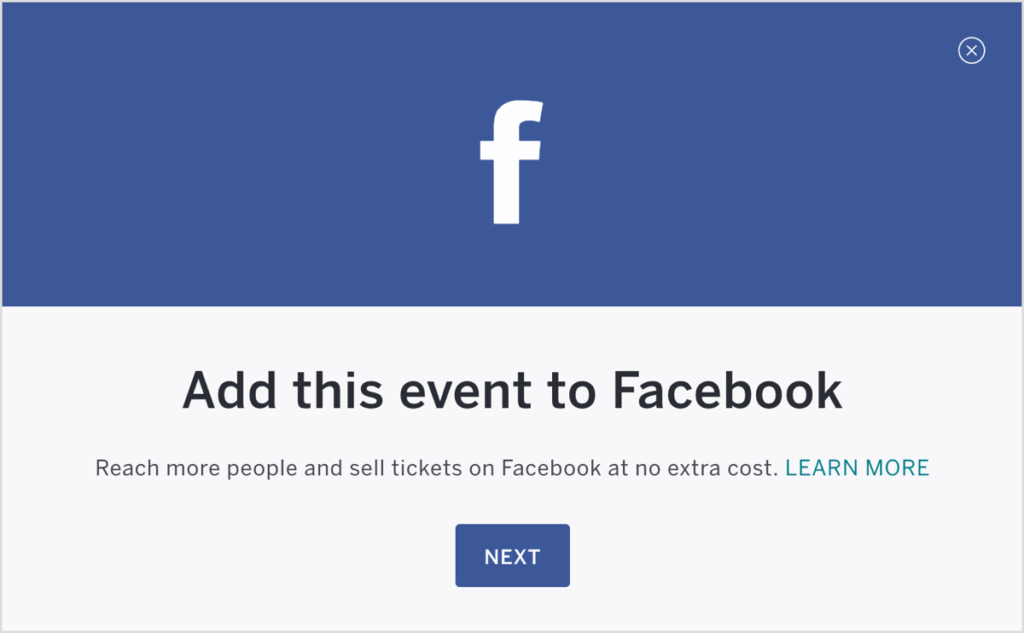How to Use Facebook’s New Eventbrite Integration to Enhance Experiences
Events continue to prop up Facebook’s business; they’ve streamlined ticketing measures to make gathering offline even easier.
As Facebook continues its evolution toward connecting communities, streamlining a major element of the Event planning process has reached the top of their priority list: ticket sales. Starting today, Facebook Event creators can include free or paid tickets on their pages—without pushing prospective attendees away from the social platform.
This isn’t the first time that Facebook has used the popularity of the Events function to enhance its users’ experience; earlier this year, an integration with Stories allowed individuals to link directly to events they’re planning to attend. Now, this latest push will allow users to commit to going to these events; in turn, event planners will be able to better plan for the attendees that are most likely to show up.
Want to use the tool for your company’s next gathering?
Create your event by heading to the Events tab
Clicking the blue “Create New Event” button, and filling out the preliminary information including date, time, locations, and public versus private access. As interest in Facebook ebbs and shifts amid the rise of other platforms, Events have remained a frequently used feature of the site. By the count of Eventbrite’s Senior VP of Platform, 700 million people use Facebook events each month. Taking advantage of this feature will allow you to reach them effectively, and make their event-going experience easier to commit to.
Events originating from a company or brand Page will also present the option to “Create Tickets.”
Here, you’ll be able to set the number of available tickets, the price (of applicable; a small fee will be taken out of each sale), and a deadline to register. An added benefit that isn’t always so intuitive for Facebook Events at present: once a participant registers, they’ll be able to add the forthcoming event to external calendars, like Google Calendar or iCal.
As with Eventbrite itself, Facebook will collect a small fee for selling tickets; reportedly, a $20 ticket will draw $1.72 in fees. But the convenience it provides for small businesses or nonprofits for predicting an adequately staffed and catered event such as a guest speaker, for example, is immeasurable—a fact Facebook and Eventbrite are each counting on.
As registrations roll in, you’ll be able to see how many individuals have purchased or reserved tickets
A major benefit for prospective attendees, Yahoo! Finance shares, is “the ability to not just indicate [your] interest in attending, but to fulfill that interest by purchasing paid tickets or registering for non-paid events, without ever having to leave Facebook.” And the benefit is mutual; USA Today correctly points out that the feature can be a boon for small businesses or entrepreneurs, for whom event planning and presentation isn’t their primary goal. As consumers and prospective companies increasingly (74% of Americans, by one count) lean toward experiences over products, those who can present an immersive and memorable experience will win out. The CMO Network’s Blake Morgan confirms this notion in Forbes:
- People want to experience all that life has to offer, and since acquiring things no longer dictates your class or status in life, millennials (and others of all generations, Morgan confirms earlier in the piece) are simply enjoying experiences over things, access over ownership.
ventbrite’s Pat Poehls echoed this fact as he detailed the reasoning behind moving into this partnership with Facebook: “our News Feeds today are filled with experiences, not the things we own…[and] partnering on this initiative is our effort to better serve the people responsible for bringing those events and gatherings to life—including small businesses and entrepreneurs whose core business is not throwing events.” Developing and presenting events might seem overwhelming or inaccessible at first, but Facebook and Eventbrite are determined to make at least one part of the process easier.
Article written by: Amma Marfo
0

